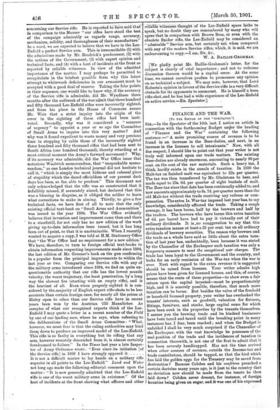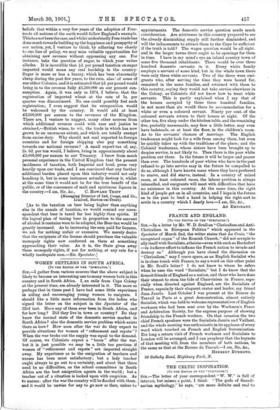FINANCE AND THE WAR.
[TO TEM EDITOR OF THE "SPECTATOR."] Sia,—In the Spectator of the 16th inst. I notice an article in connection with the forthcoming Budget uniler the heading of "Finance and the War" containing the following sentence :—" A mOre promising source of revenue is to be found in an increase in the Beer-duties, and next, in an increase in the licenses to sell intoxicants." Now, with all due respect, I should like to point out that your writer is not truly well informed upon our trade matters. The existing Beer-duties are already enormous, amounting to nearly 90 per cent. on the coat of the raw materials. Such a heavy tax, I think, hardly, exists in the annals of taxation. In 1880 the Malt-tax on finished malt was equivalent to 22s. per quarter. The tax was then transferred by Mr. Gladstone to beer, and made equal to 23s. 6d. per quarter of eight bushels of malt. The Beer-tax since that date has been continually added to, and now amounts approximately to 8s. 7d. per quarter more than the old Malt-tax without the trade receiving any redress or com- pensation. The extra is. War-tax imposed last year has, to my knowledge, considerably affected the trade. Taking a rough average, it has been borne, half by the brewers and half by the traders. The brewers who have borne this extra taxation of 6d. per barrel have bad to pay it virtually out of their ordinary dividends: It is no exaggeration to say that this extra taxation means at least a 25 per cent, tax on all ordinary dividends of brewery securities. The reason why brewers and the trade as a whole have said so little about the extra taxa- tion of last year has, undoubtedly, been because it was stated by the Chancellor of the Exchequer such taxation was only a temporary measure to meet the exceptional toctr charges. The trade has been loyal to the Government' and the country, and looks for an early remission of the War-tax when the war is over. Next with regard to the extra revenue it is suggested should be raised from licenses. Your writer admits high prices have been given for licensed houses, and this, of course, means that the rents of these properties—to show even a fair return upon the capital invested—must be proportionately high, and it is scarcely possible, therefore, that much more taxation can be borne. But besides the value of the freehold or leasehold licensed property, your writer has overlooked the tenants' interests, such as goodwill, valuation for fixtures, fittings, furniture, and stocks, large capital sums for which have been sunk in the properties by the tenants themselves. I assure you the brewing trade and its kindred businesses have been taxed and taxed until the breaking point in many instances has, I fear, been reached ; and when the Budget is unfolded I shall be very much surprised if the Chancellor of the Exchequer, with the vast knowledge he possesses of the real position of the trade and the incidences of taxation in connection therewith, is not one of the first to admit that it has been severely handicapped. Has not the time arrived when other sources of revenue, outside the Income-tax and trade contributors, should be tapped, so that the bird which has laid the golden eggs for the Treasury may be saved from destruction? Because Cobden and his confreres preached a certain doctrine many years ago, is it just to the country that no-deviation now should be made from the tenets he then laid down ? Cobden never dreamt, for instance, of foreign bounties being given on sugar, and it was one of his expressed beliefs that within a very few years of the adoption of Free- trade all nations"; of the earthwould follow England's example. This has not been the case, and whilst undoubtedly Free-trade has done much towards building up the happiness and prosperity of our nation, yet, I venture to think, by adhering too closely to one line of policy, we may miss valuable opportunities for obtaining -new revenue without oppressing any one. For instance, take the question of sugar, to which your writer alludes. It is incredible that id. per pound taxation on sugar imported would mean any real hardship in the country. Sugar is more or less a luxury, which has been abnormally cheap during the past few years, to the ruin, alas ! of some of our oldest Colonies, and it is estimated that id. per pound would bring in to the revenue fully R6,500,000 on our present con- sumption. Again, it was only in 1874, I believe, that the registration of imported wheat at the rate of is. per quarter was discontinued. No one could possibly feel such registration; I even suggest that it reimposition would be welcomed by the country. It would add at least 23,000,000 per annum to the revenues of the Kingdom. There are, I venture to suggest, many other sources from which additional revenue could with ease and justice be obtained,—British wines, to wit, the trade in which has now grown to an enormous extent, and which. are totally exempt from excise-duty. Why should not coal exported to foreign countries and for foreign shipping also pay something towards our national revenue ? A small export-tax of, say, 2s. 6d. per ton would, I believe, bring in approximately about X5,000,000 per annum to our Treasury. I know from much personal experience in the United Kingdom that the present incidences of taxation, both Imperial and local, press very heavily upon our trade, and I am convinced that any further additional burden placed upon this industry would not only handicap it, but in some instances actually destroy it, whilst at the same time it would not be for the true benefit of the public, or of the consumers of malt and spirituous liquors in
Limited, Burton-on-Trent).
(As to the taxation on beer being higher than anything else in the apnols of taxation, we would remind our cone -spondent that beer is taxed far less highly than spirits. If the logical plan of taxing beer in proportion to the amount • of alcohol it contains were to be adopted, the Beer-tax would be greatly increased. As to increasing the sum paid for licenses, we ask for nothing unfair or excessive. We merely desire that the recipients of the license should purchase the valuable monopoly rights now conferred on them at something approaching their value. As it is, the State gives away these monopoly rights, if not for nothing, at any rate for a wholly inadequate sum.—En. Spectator.]







































 Previous page
Previous page